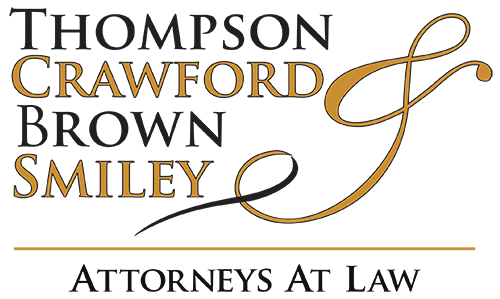YOUR TRUSTED WILL ATTORNEYS IN NORTH FLORIDA
Expert Legal Guidance for Wills in Florida
Planning for the future is a crucial step in ensuring the well-being of your loved ones and the preservation of your legacy. At Thompson, Crawford, Brown & Smiley, our dedicated team of attorneys specializes in providing comprehensive will services tailored to your unique needs and preferences. With our expertise in estate planning and probate law, we are committed to helping you create a legally sound and personalized will that reflects your wishes and secures your family’s future.
Why Choose Our Will Services:
1. Expert Guidance: Our experienced attorneys have a deep understanding of Florida’s estate planning laws. We offer expert guidance throughout the entire process, ensuring that your will is meticulously crafted, legally valid, and in compliance with all relevant regulations.
2. Personalized Approach: We recognize that every individual and family is unique. Our attorneys take the time to listen to your concerns, understand your goals, and tailor our services to meet your specific requirements. Whether you have complex assets, blended families, or specific bequests, we design your will to address all your needs comprehensively.
3. Asset Protection: Protecting your assets and ensuring their smooth transition to your heirs is a vital aspect of estate planning. We provide strategic advice on asset protection, minimizing potential tax liabilities, and structuring your will to safeguard your wealth for future generations.
4. Guardianship Designation: If you have minor children, appointing a guardian is one of the most critical decisions you can make in your will. We assist you in selecting a suitable guardian who will provide a loving and stable environment for your children, offering you peace of mind knowing their future is secure.
5. Healthcare Directives: In addition to your will, we can help you establish healthcare directives, including living wills and powers of attorney. These documents ensure that your medical and financial decisions are made by trusted individuals in the event you are unable to make them yourself.
6. Probate Assistance: We provide comprehensive probate services to facilitate the smooth administration of your estate after your passing. Our knowledgeable probate attorneys guide your loved ones through the legal process, easing the burden during a challenging time.
Secure Your Family’s Future:
Don’t leave the fate of your assets and the well-being of your loved ones to chance. Trust Thompson, Crawford, Brown & Smiley to help you create a clear, legally binding will that reflects your intentions and protects your family’s future. Our compassionate and dedicated attorneys are here to assist you every step of the way, ensuring your wishes are respected and your legacy is preserved.
Schedule a consultation with our experienced will attorneys today. Let us assist you in crafting a will that provides security, peace of mind, and a lasting legacy for generations to come. Your family deserves the best – entrust your estate planning needs to us, and we will guide you towards a secure and prosperous future.
Call us today for your initial complimentary consultation!
About Thompson, Crawford, Brown & Smiley
Our litigation knowledge and experience is vast with a history of success in State, Appellate, Florida Supreme Court, U.S. District, U.S. Circuit appellate and Bankruptcy Courts. Founded in 1993, our commitment to superior legal services has always been our cornerstone.
We are one of the few firms in the Tallahassee area to specialize in ERISA law as well bankruptcy, personal injury, commercial litigation, insurance defense, family law and more.
Each of our partners has a broad knowledge base in addition to a specialty that allows them to further their understanding of their chosen law specialization:
- Thomas Thompson’s primary practice is in the litigation field, both as plaintiff and defense counsel.
- Scott Smiley’s practice concentrates on complex family Law matters.
- William Crawford handles the firm’s commercial litigation, bankruptcy, corporate and real estate.
- Mallory Brown is involved in most of the practice areas of the firm including employment claims, probate, and estate planning.
- Alyssa Silva primarily practices in family law
